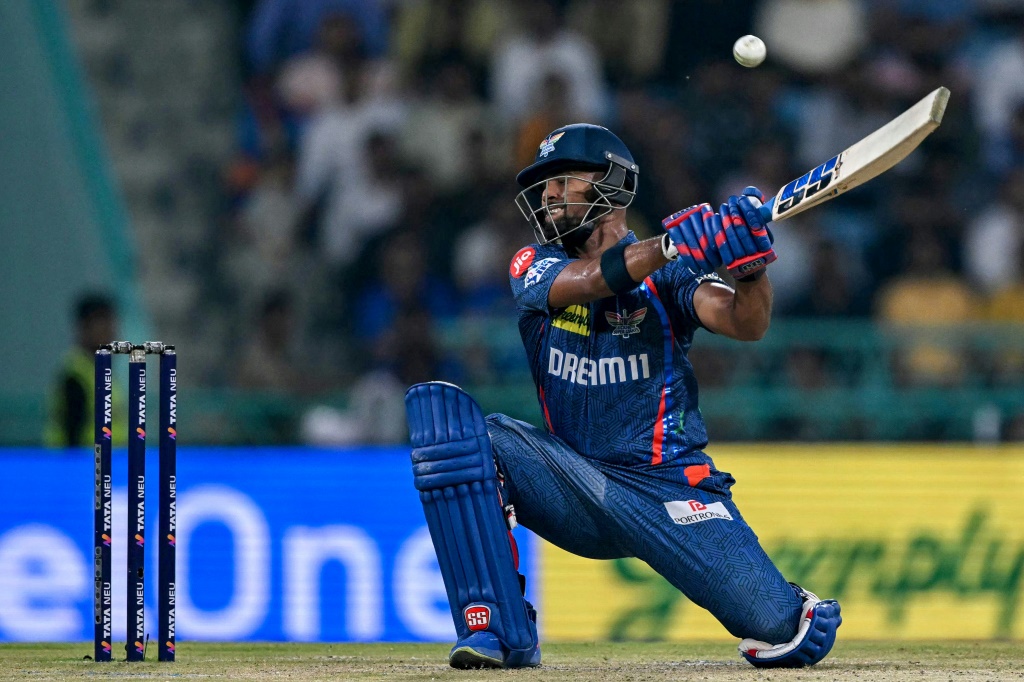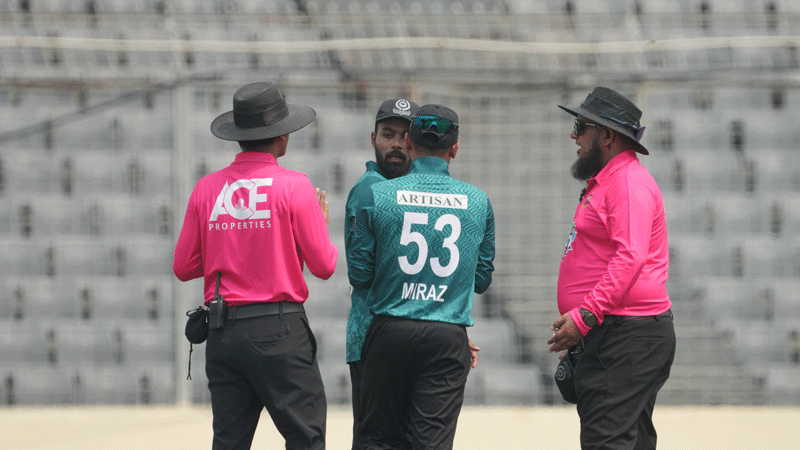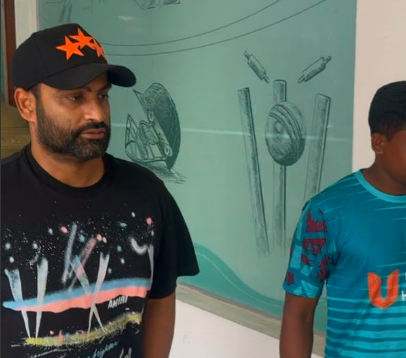Lots of trials and tribulations have transpired in Zimbabwe cricket: Alistair

© Cricfrenzy

|| CF correspondent ||
Former Zimbabwe skipper Alistair Campbell is one of the few members who enjoyed the privilege of playing alongside a generation that is considered to be the Golden Generation of Zimbabwean cricket. The free and fluent stroke-maker of his days is making the most of his experience count through a different medium – commentary. Cricfrenzy had an exclusive chat with Campbell where he looked to be in a mood to disclose aspects of his life and cricket in general.
Here are the excerpts...
Cricfrenzy (CF): How do you enjoy broadcasting now?
Alistair Campbell (AC): You miss the playing days, the competition you miss, being out there, get the juice flowing. It’s always good to be on the field with all the teammates. When you get a bit older, you don't miss the hard work that has to go with that. You know, the gym, the running, the practice and the warm-ups. And also touring, airplanes, hotels, being away from home all this sort of things, they are not negative but we did not play as much as these guys are playing. With all the new T20 leagues around the world, guys are so busy playing and staying lots of time away from home. Also remuneration’s improved, team policies have changed. Now the teams has policies of family inclusion. So, lot of the time the wife and kids can come. It's not as bad as it used to be. I remember going on a Sri Lanka-tour, my wife had to have a cesarean section so that we can have our child before I went on tour. That was it, it was 'cricket comes first and everything else secondary'. But that's changed a bit now and it’s a good thing I suppose. After the cricket most of the guys look to stay involved in some way, you know, be it media, or commentary, or coaching, or umpiring and or few other things related to administration. I chose the commentary, I have done some admin work with the Zimbabwe Cricket as well just to keep [myself] involved with the game. Once it has been part of your life for so long, you wanted to stay involved in some shape or form. Just to stay a close to keep your cricket fixed as it works. I think it’s good. Even though everyone don't stay with the cricket, but they always pick up the paper and notice what is going on. So you never go away from the cricket.
CF: You played a lot of cricket in the sub-continent and did well against good [bowling] attack back in your days. But currently, a lot of Zimbabwe players are not very good at performing here. What changed over the years?
AC: Results are there, you don't want to get into this stage where our generation is better than this generation. Stats suggest our generation was better. We had some great player of spin – Andy flower, and then Dave Houghton and we were able to learn from him. It was the beauty of our time when I was growing up, we had such good mentors. Dave Houghton played for my club-side as well. He basically taught me how to play spin. You know, what to look for, where to score – all this sort of things, and that's one thing I'm grateful to him for. Once you’ve got the guys who play it well and are confident against it, it rubs off on the rest of the team. This generation, they have their ups and downs, they haven't been successful as a team as far as their results are concerned. But there some guys who can play, Brendan Taylor is a terrific player and has got a terrific record. I think Sean Williams is a good player of spin and Sikandar Raza too. They won against Sri Lanka 3-2 and they played spin really well. They have had their moments, but not as consistent as we were before. Having said that, we played lot more over here, we had tours in Pakistan, India, Sri Lanka; [we] came to Bangladesh a few times as well. We spent a lot of time here in the sub-continent. We had to work our way to score runs, to play them, to be successful and competitive. It helps when you are playing a lot as well.
CF: What's the formula to play well over here?
AC: First you have to work out how you want to play. Once you devise that method and you’re confident about that method, then you have to go and practice it. You have to make sure you are confident about executing. When we went to Australia from India, I know Justin Langer phoned Andy Flower and said, 'Please, can you tell me about the sweep shot and the fundamentals of it? I want to score runs in the sub-continent playing sweep shot.’ Hayden did the same thing in 2001. But people think you just practice in the nets and score runs. No, you have to play hundreds and hundreds of times to work out how to play spin. When it comes to sweeping, it’s all about sweeping on length, not the line. You either play touch-sweep or flat-sweep or pick up-sweep; there are various ways of sweeping. But there is no substitute for practice. Everyone knows that here you have to sweep in the sub-continent. Some people like to play it differently but that comes from practice. That's one thing I like to do. And secondly, you need to be able to use your feet. Once you do that, you put the bowler off his length. As soon as you allow the bowlers ball at you and you are just static at the crease, you are not giving yourself too many options, whereas if you are using your feet and sweeping, you will find you get a lot more scoring options, lot more boundary-balls that’s been bowled at you – because of the way you’re trying to dominate the bowler. These guys need to reverse pressure more than they absorb the pressure. The fear of getting out is always in the back of your mind. As a batsman, you’ve got to put that out of your mind and have the positivity of trying to score.
CF: Like Langer and Flower, do you think modern players do that – talk to the other team’s players to get some tips?
AC: You wouldn't call someone from the home country, where you are touring. Langer called Flower because his team [Zimbabwe] had just been there [to India]. I suppose it's just professional courtesy. It just happened, because we were going to Australia and they could meet up and have a session. I don't think it happens now. Now there is so much to information with the videos, data. So you can sit on with your analyst, that's the guy you call. If you want to work on something, then you pull up Andy flower playing the sweep shot. You can check it out in your room on YouTube. If you have a chance to meet him, get his number, sure – send him a message. I think everybody will be obliged to give up information. There is no doubt about that. But people phoning each other, like we used to do, does it happen now? I don't think so.

In the past we used to visit the changing room of the oppositions, you could have a drink and talk, that doesn't happen [now]. That comradery and the learning from the oppositions, we used to do a lot of that; lots of teams did. But that doesn't happen too much anymore. All the young stars want to get on their mobile phones and use Instagram, Twitter and all this sort of stuff. Put it that way, the world has changed.
CF: Do you think that mateship made the game more interesting?
AC: I think so, yes. Guys who played the game will tell you, they played hard on the field and then always had a drink off the field. We got to know guys pretty well, because of that. I think nowadays, people really get to know the opposition because of the different venues, guys finish playing and as soon as you are done, you pack up and go. You come across with one of the guys in the breakfast, of course, you had a chat. But getting together for an hour, that doesn't happen that much anymore. In the big series, like the Ashes, after the whole thing's finished, they get together and have a chat and congratulate. But sometimes it’s a definite ploy; they don't talk to the opposition to prove they are hard. But most of the times, players before us did that, we did that. But I don't think it’s part and parcel of the game anymore.
CF: You had a great tour in ’93-94 in Pakistan, Zimbabwe did well in ’99 under you, where you guys won the series against the red-hot Pakistan team. What was that like?
AC: It's a very good memory, like I said, we had our own good players. We knew – we can compete, we have got some good enough players to do that. Yes, definitely, we played on green wickets. Our seam bowlers were tricky and were very good. They [Pakistan] had a very good attack as well and they were probably too good for us. They were going past the outside edge too many times and our guys attacked their batsman. It brought us to the same level, see if we played on a flat wicket with the guys who can reverse-swing the ball – Waqar, Wasim, Shoaib, they would probably have bowled us out and won the game. They had too much firepower, but when the condition’s changed, that brought the team closer together. Because their batsmen were struggling as well. It was sort of played in our favor. Few things went our way and we ended up winning it. It was memorable and we were a very close unit and we played like a team.
CF: How do you see modern-day captaincy?
AC: There’s a lot more analytics to support [the captains]. A lot of teams decided to have different captains for different formats, due to fatigue and other issues. I think it's changed the way you approach things. When I was playing, there was no T20 cricket. So, you were just the captain of the ODI and the Test side. Now there is T20, so guys think they can’t play all formats, they’ll be burnt out. So you need to have separate captains like England have nowadays. So there are different beliefs in different countries. I think ultimately, you are only as good as your team. A lot of the team have leadership groups with the senior players. Sure, you have to go on the field and take the decision but you have got to discuss plans beforehand. I have had great people to lean on, in the form of Andy Flower, Grant Flower, and Dave Houghton. They always helped me with their ideas. Captaincy – it’s always a collaboration. But you have to make your own decision. Sometimes you listen to an advice and you do what your gut says. But you always welcome all this advice. Because, under pressure, you can't see the wood for the trees. Sometimes the coach sends out some message, it’s a team effort. And sometimes captain pick the teams, decides who they want to play and who they don't. Not everyone does that, some don't prefer to do that. So it’s up to the individual.
CF: Zimbabwe team, in the past, was a bit like current Bangladesh team. Do you feel the same way?
AC: Yes, there is a definite sort of comparison. You know, up to 2000, Zimbabwe never lost to Bangladesh and that has changed around now. And Bangladesh got superstars now. Like Shakib and Tamim Iqbal. Mashrafe has led from the front and they've got good spinners as well. There is a side who believe in themselves and believe they can win at the highest level. And we did have that belief. But we didn't believe as much as we should have, we could stick together for another few years. The stuff that happened in Zimbabwe is well documented and what transpired, if we had stayed together for a bit longer, we might have found ourselves in a better position.
CF: Do you think Bangladesh got the firepower to do well in the next World Cup?
AC: This side, their result shows that. You can't argue with the results – the Champions Trophy semifinal, the Asia cup final. They really believe in themselves. If they pick their best side going into the World Cup, they will have a very good chance in those English conditions, particularly in the late summer – if it's a hot summer – the pitches will more subcontinent-like. Bangladesh got the strike-power in Mustafizur. They’ve got the firepower as far as their batting is concerned. And they also weathered some big storms. Like top-order collapses and they have been able to recover from that and win games. The more you do that, the more you start believing. When you get into those situations again, then you will know how to get out of this. So I think everybody is fit going into the World Cup, this is their best chance of going pretty deep. I think they’ve got a very good chance.
CF: How do you see the transformation of Zimbabwe cricket from your era to the current era?
AC: Well everybody retired as you know, some got fired all this sort of stuff going on at that time. Then cricket was left with a bunch of youngsters with no mentoring. There has to be succession and it wasn't the case. So they got thrown into the deep end, these young cricketers. And some of them never recovered. When you get beaten the whole time, you start doubting yourself and your ability. You know, we lost our Test status for a while because the guys weren’t good enough. So, there are lots of trials and tribulations that have transpired in the Zimbabwe cricket. Everyone wants them to be back to where they were before. That comes with better infrastructure, clubs, and first class. You are only as good as your domestic infrastructure. You can't play international cricket in isolation. The financial woes are well documented in Zimbabwe cricket. So it’s not an overnight solution either. You have to start from the beginning and get some youngsters. Like Brendan Mavuta is here, he is a product of a good system. He played well in South Africa, got picked in the South Africa Super League, and bowled some good leggies. He is innovative with the bat, alive one in the field. So there are youngsters coming through. Blessing Muzarabani was one of them. Unfortunately, he went to play for Northamptonshire with the Kolpak deal. So, first you have to create young players, then you have to retain them. The only way to retain them is to pay them properly. Otherwise, they are going to go away, it is human nature. It is what it is. There is no easy solution to it. Bangladesh have definitely overtaken us, Afghanistan are now better than us. Then there is Ireland, the Netherlands, and Scotland, all upcoming, all putting effort into infrastructure. So if we don’t wake up as a cricketing nation, we are going to slip further and further down.
CF: You have been an administrator, what can they do to get back on the map?
AC: Well, I’m glad that the financial issue has been sorted out. The ICC have cleared that. Now the money is coming in, Zimbabwe can go into actual infrastructure development. What they need to do is invest in the right structures, in the right personnel, to create those structure and run them properly. The template is there, it doesn't have to be reinvented. It just needs to be run and resourced properly. Hopefully, now that can start to happen. And other guys can help as well. I'm starting up my own high-performance program. If there is some private enterprise starting up to assist Zimbabwe and sorting out the structure and giving these guys the opportunity, I think that helps as well. I think it’s a collaborative effort. The ex-players, the sponsors, all those have a role to play just to put Zimbabwe back on its feet. The system needs to start working again. It’s not going to happen overnight, as I said before. There needs to be a five years’ plan. Upcoming World Cup is gone, we have to work towards the next one. Automatically qualifying for the World Cup – that's got to be the goal. Let’s make our goal to achieve the top eight. In five years’ time, we need to be among the top eight. How do we do that? That's I suppose the goal is.
CF: World Cup qualifier shock – how was the mood in Zimbabwean cricket?
AC: Everyone reacted badly. You are three runs away from the World Cup competition, and everyone was devastated. The fallout has been ugly. Coach, captain being fired, people being dropped. There was the money issue and they didn't play after that, I mean it was a mess, to be honest and no one wants to see that. Now hopefully it has been forgotten and people can pick themselves up and the senior guys, who have a big role to play, are backing the team. We are not going to be at the World Cup; that's the reality. But we got to build [ourselves] for the next one.
CF: What about the fans? They have been suffering for ages despite being very supportive…
AC: You know, at the World Cup qualifier, the stadiums were packed. They watched the match. There was big national support. Everyone wants to see their team do well. Look at Bangladesh, they have been delivering. Fans always like supporting a winning team. But Zimbabwe hasn't been winning. There are a few things that need to change, if you can show them it has been changed, then the public come back. If they see meaningful effort being put in, to get things back on track, then they will buy it. I’m sure, if the Zimbabwe Cricket is open and genuine then the fans will come back and keep supporting. Zimbabwe is a sports-loving country. But when they come back, let’s give them a team which is going to compete. That’s what they want to do. They want to cheer again. They are tired of not being able to cheer again and going home. Hopefully, there is some light at the end of the tunnel with what’s transpired with the ICC. Hopefully, that light transfers [Zimbabwe] into a better-playing team.




